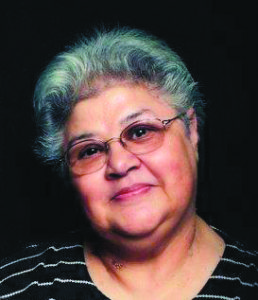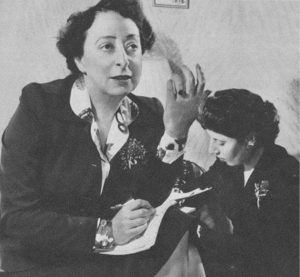

Irna Phillips (July 1, 1901 – December 23, 1973) was an American scriptwriter, screenwriter, casting agent, and actress. She is best known for creating, producing, and writing several of the first American daytime radio and television soap operas. As a result of creating some of the best known series in the genre, including Guiding Light, As the World Turns, and Another World, Phillips is credited with creating a daytime serial format with programming geared specifically toward women. Later known as “Queen of the Soaps,” she introduced techniques such as the organ musical bridge to give a smooth flow between scenes and the cliff-hanger ending to each episode.

The origin of the soap opera can be traced back to short, daytime serial dramas that took place on the radio in the 1930s. Radio executives wanted to increase ad revenue to their stations so they began to court businesses that sold household products since the majority of people at home during the day at that time were women homemakers. Procter & Gamble became the first major advertiser to sponsor one of these daytime dramas using their Oxydol soap powder, a laundry detergent. It didn’t take long for other soap and household goods manufacturers to get on the bandwagon. Proctor & Gamble even began to produce their own radio shows. These radio dramas began to be associated with their advertisers, hence the name “soap opera.”
The first real soap opera called Painted Dreams was created by Phillips in 1930 at radio station WGN in Chicago. It was a 15-minute daily drama involving a family that included a widow and her unmarried daughter. Phillips later went on to create the first soap opera on television in 1949 called These Are My Children, (not be confused with All My Children, a completely different show that debuted in 1970).
In 1930, Phillips created the serial Painted Dreams, which aired daily except Sundays on local Chicago network WGN. Painted Dreams began as an unsponsored program, but Phillips believed that a radio series must be a “utility to its sponsors” and that it must “actually sell merchandise; otherwise the object of radio advertising has failed.” With this in mind, she wrote in an engagement and a wedding which provided the possibility of product tie-ins.
Phillips’ second serial, Woman in White, was one of the first daytime serials with a hospital setting.
In 1937, Phillips created her third radio serial, The Guiding Light (shortened to simply Guiding Light after 1975), basing it on personal experiences. After giving birth to a stillborn child at age 19, she found spiritual comfort listening to sermons that centered on the Brotherhood of Man. These sermons formed the nucleus of The Guiding Light. From 1937 to 1946, the series was broadcast from Chicago on the NBC radio network.
The show was cancelled by NBC twice; once in 1939, and once in 1946. After the first time on October 13, 1939, it was brought back by popular demand of the listening audience and began again only four months later on January 22, 1940.
NBC cancelled the series a second time on November 29, 1946, coinciding with the U.S. Federal Communications Commission forcing a split of NBC and the creation of the ABC network. CBS would pick up the series seven months later on June 2, 1947. It transferred to television in June 1952, where it would stay for the remainder of its run until its television conclusion in September 2009.
On January 31, in 1949, These Are My Children was the first soap opera broadcast by a major television network, NBC. This series was centralized around an Irish family that lived in a Chicago boarding house. Each show was 15 minutes long and aired Monday through Friday at 5pm. When the show failed to capture attention from critics, the soap opera was deemed to be a flop and was cancelled a month later. The Television World paper was extremely displeased with the show and claimed “there is no space on television for this type of program.”
Phillips was a fiercely independent entrepreneur who retained ownership rights to all her series, producing through Carl Wester and Company and allowing agencies, sponsors, and networks little control over her soap opera empire.
In the 1940s, Phillips wrote two million words a year, dictated six to eight hours a day, and earned $250,000 a year. Her other serials of the era included The Road to Happiness (1939–60) and The Brighter Day (1954–62).
Proctor & Gamble fired Phillips in early 1973; it was to be her last writing assignment; she died on December 23, 1973, aged 72.
No Comments
Leave a comment Cancel